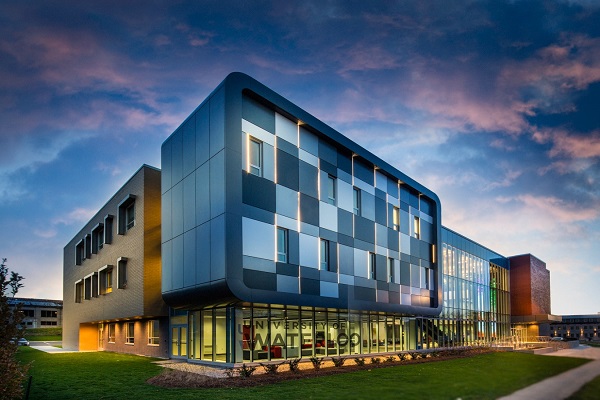University of Waterloo students create solutions for the local health-care system
On May 16, Velocity kicked-off a partnership with the Grand River Hospital Foundation (GRHF) as part of their Care Never Stops campaign by presenting the Health Innovation Challenge. The student hack-a-thon with a twist provides an opportunity for University of Waterloo students to take part in designing solutions to health care challenges being experienced within our local community.
The 10-day challenge aims to have the final teams’ design solution lead to fundamental research, and potentially make an impact in both our community-based health-care systems and around the world.
“Many of the companies created at Velocity were from students just like you and they are here today with a drive, an energy and the compassion to solve big problems,” said Moazam Khan, director of Velocity health, to the more than 100 students in attendance at the kick-off for the challenge. “Opportunities like the Health Innovation Challenge provide unique facets to explore some of the most challenging problems our health-care systems.”
Students registered in groups or as individuals and were assigned teams. Velocity hopes that by grouping students from various academic backgrounds they can connect through an intersectional approach. The challenge allows students from different faculties to offer unique perspectives within their team and come together to design a health-care solution.
Students designing health-care solutions
During the Health Innovation Challenge, each student group will be working together to solve one of three problem spaces in our health-care system: eliminating hospital waiting rooms, connecting the community before and after the hospital, and support for the aging population and their families.
Paul McIntyre Royston, president and CEO of the GRHF told the students that these are big challenges in our community and although Waterloo region is doing well compared to provincial averages, “The problem is that the wait time still averages over eight hours – so solve it, please.”
For Cyrell Alcazaren, a student in the Faculty of Science, her team is one of many student groups working together to design a solution that can eliminate hospital waiting rooms.
“As a biology student, I will be working in the hospital in the future and I know that it will be one of the issues, so I want to learn and help solve the problem as early as possible,” Alcazaren says.
Joining Alcazaren is Jaya Lalwani, a student in the Master of Business, Entrepreneurship and Technology. She recalls attending a pitch competition similar to the GRHF Innovation Health Challenge, where a startup company was trying to eliminate the wait time to see a neurologist.
“It takes two years to get an appointment to see a neurologist even if you’re diagnosed with Parkinson’s disease and they were trying to solve that problem,” Lalwani says. “I’m new to Canada and I have been hearing this a lot that no matter how severe of a problem that you have, in a hospital there is a minimum wait of three hours even if it’s an emergency. It’s a real problem that nobody has found a solution yet.”
Menatalla Ellag and Aditya Malhotra are Engineering students within the group who both hope to offer an engineering perspective on the design element of the challenge.
Olivia Moluchi and Catherine McKenna met after the COVID-19 pandemic and bonded over their shared experience in the Biological and Medical Physics program. McKenna invited Moluchi to join her in the challenge as they work together to design a solution that can support for the aging population and their families.
“My big thing is I want to get involved in the health community that we are in as medical physics students,” Moluchi says. “I thought this was a great challenge to get our foot in the door and meet new people that are like minded. But I was also interested in the kind of issues that are very important in our society and in life that will be addressed in this challenge.”
The pair of students are looking forward to meeting with mentors, communicate with other student groups and start brainstorming on their design for the challenge.
Each student group will have 24/7 access to workspaces on campus, technology, equipment, meet with mentors, attend workshops and have the chance to win their share of the $18K grand prize. The winning team will be selected based on their innovative design solution that will help solve one of the three problem spaces that patients and health-care professionals are facing in the health-care system.
Health innovation challenge semi-finals and finals
Over the course of the Health Innovation Challenge, students will have 10 days to workshop and design a solution for their assigned problem space. On May 25, each student group will then have the opportunity to present their three-minute pitch live at the Velocity Incubator followed by a two-minute Q&A session with a panel of judges.
On May 27, two teams from each of the problem spaces will be chosen to pitch live at the SDG Factory in downtown Kitchener in hopes of winning their share of the $18K grand prize. The winners will be announced before the final Care Never Stops campaign event – a rally for health at the Sun Life parking lot. Waterloo community members can register and join for free.
Semi-finals panel of judges
Moazam Khan, director, Velocity health
John Dick, director, Velocity campus
Abhinav Chawla, co-founder and CTO, Stabl Inc.
Jessica Lunshot, president and CEO, TAMVOES
Rachel Bartholomew, founder and CEO, Hylvy Health
Finals panel of judges
Carla Girolametto, director of Research, Innovation and Clinical Trials, GRH
Neil Naik, board member, Grand River Hospital Foundation
Vivek Goel, president, University of Waterloo
Andrea Edginton, hallman director, School of Pharmacy University of Waterloo
Adrien Cotê, executive director, Velocity

